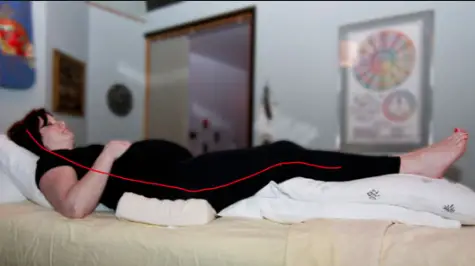Hip Pain at Night While Sleeping On your Side – The Potential Reasons
If you are suffering from hip pain at night (especially while sleeping on your side), you certainly know it. And maybe it is not until you have it that you realize just how important a hip is – even for basic mobility and independence.
It can make the most simple tasks, such as getting out of a chair, walking up or down stairs or even just walking to the shops, virtually impossible.
Osteoarthritis symptoms include feeling a general stiffness in the early stages, going on to a feeling of jagged glass cutting into the hip with every step or you might get a sudden searing pain when you try to move or rotate your leg in a particular direction.
It can cause you to start limping and then you may also develop a backache as the spine goes out of alignment to compensate.
Literally, millions of sufferers are driven to see a doctor resulting in about three-quarters of a million hip and knee replacement surgeries a year.
Hip pain is often thought to be limited o the older generation but it can actually affect people of all ages, young and old alike.
The main cause is osteoarthritis, which generally relates to the gradual wear and tear of the cartilage surrounding the joints and inflammation of the joint lining, whether that is through age or through excessive use as in certain sports and regular jogging.
Hip replacement surgery can also arise in response to traumatic injuries, accidents and inflammatory infections.
Inflammatory hip pain is often one of the rheumatoid arthritis symptoms which can affect the whole body and joints in all areas. If you are older than 65 yrs or have been a sports player or jogger for a number of years then the chances of you having hip pain are quite high and this is when the number of hip operations increases.
Hip Pain at Night While Sleeping on Side
There’s a lot of similarities between hip pain while sleeping and hip pain at night, but we thought there was just enough of a difference to warrant a separate post.
Hip pain at night while sleeping indicates more than anything that either lying down or moving around in slightly awkward positions is causing you pain, so in this post, we will be looking at potential reasons that this could happen.
Potential Reasons for Hip Pain at Night while Sleeping
Hip arthritis is a condition that is worsened by movement because the pain is caused by movement that isn’t protected by cartilage (cartilage is worn away if you have arthritis). If you are an active sleeper that moves around a lot it’s possible for you to irritate your Hip at night while sleeping.
If you are an athlete and have hurt your hip recently you may have Hip Bursitis. This injury consists of your bursas around the joint swelling, usually as a result of contact. It often hurts when touched, and when you are sleeping at night it’s easy to roll into a position that puts pressure on your Hips, and by extension an inflamed bursa.
Adding on top to bursitis, if you are an athlete who has been performing a lot of repetitive hip movements lately you may have developed Hip flexor tendonitis, which is similar to bursitis because it is caused by inflamed tendons.
Is it possible you have a hip flexor strain? There are many muscles that connector surrounds the hips that can cause the pain. While these strains heal they prefer to be largely immobile, so if you are moving around a lot you may be irritating them which causes pain while at night while sleeping.
Treatments For Hip Pain at Night While Sleeping
While we have touched over a few possible causes for your hip pain at night while sleeping this is by no means a comprehensive list. If you are experiencing hip pain while you are sleeping at night for more than a day or two I recommend going to a doctor who will have the proper tools to evaluate your individual situation.
Hip injuries can be very serious and it is important to catch them early for treatment before they get worse. For now, if you need to manage pain until you can see a doctor take anti-inflammatory pills according to the label before you go to sleep and see if that helps you temporarily.


